 As a sporadic but enthusiastic follower of British athletics, I find the Dwain Chambers story very dispiriting. There is something utterly compelling about the sprinters – from Jesse Owens, via Jim Hines’s 9.95 seconds in the 1968 Olympic 100m final, to the prodigious Carl Lewis, our own Linford Christie, and beyond. Britain has done well in these explosive events, and particularly so in 4×100 relay: black youngsters have performed with particular magnificence over the years, and acted as superb role models to children in deprived communities. So the selection of Chambers for next month’s World Indoor Championships sends all the wrong signals.
As a sporadic but enthusiastic follower of British athletics, I find the Dwain Chambers story very dispiriting. There is something utterly compelling about the sprinters – from Jesse Owens, via Jim Hines’s 9.95 seconds in the 1968 Olympic 100m final, to the prodigious Carl Lewis, our own Linford Christie, and beyond. Britain has done well in these explosive events, and particularly so in 4×100 relay: black youngsters have performed with particular magnificence over the years, and acted as superb role models to children in deprived communities. So the selection of Chambers for next month’s World Indoor Championships sends all the wrong signals.
The worst is the spectacle of an impotent governing body: UK Athletics may well be unanimously opposed to the return of Chambers, who was banned in 2004 after testing positive for the prohibited drug THG. But its unanimity was without a shred of force. The selectors were obliged by their own rules, and the threat of legal action to pick Chambers. One has to ask: why is the banning period of two years so short? Why did the governing body take Chambers off the list of those athletes to be tested, given that he was so likely to return to the track?
If, like me, you are an enthusiast for the 2012 London Olympics, then it is hard to think of a worse message to send to the athletically gifted teenagers who will now be eyeing a place in the British squad for that event. Cheats get away with it and play the system. Those who stick to the rules stay at home. The authorities huff and puff to no effect. Not exactly Chariots of Fire, is it?






Comments